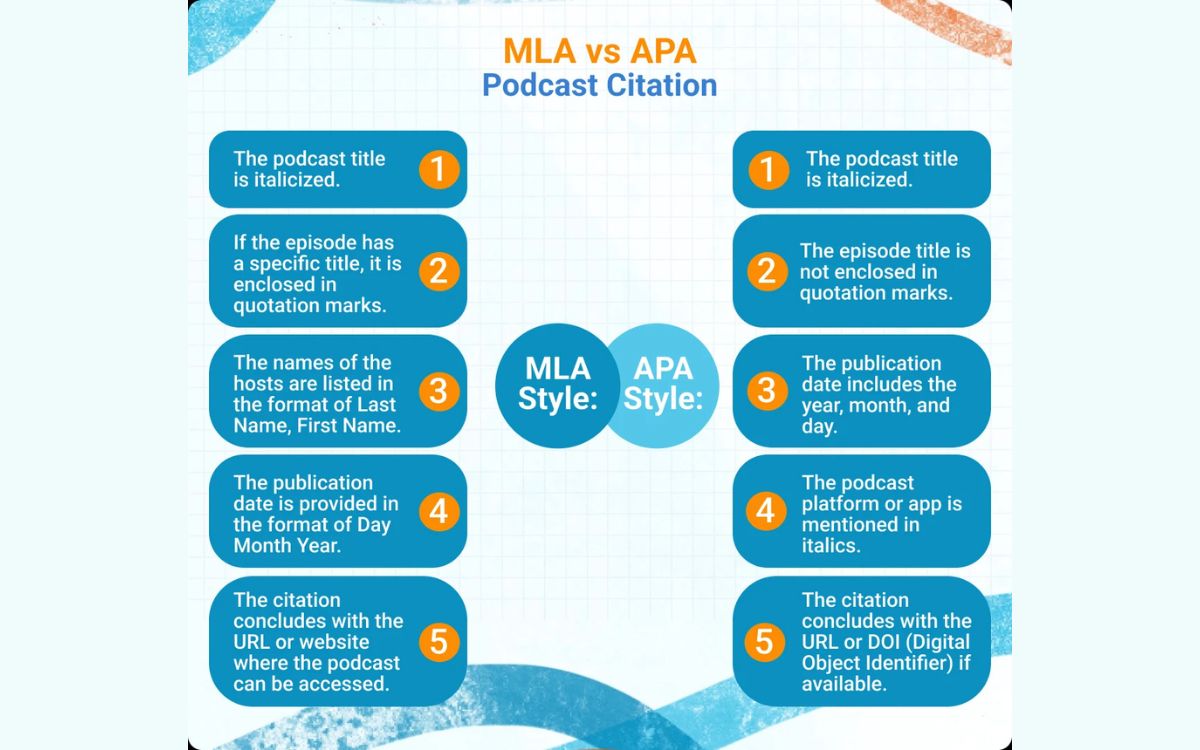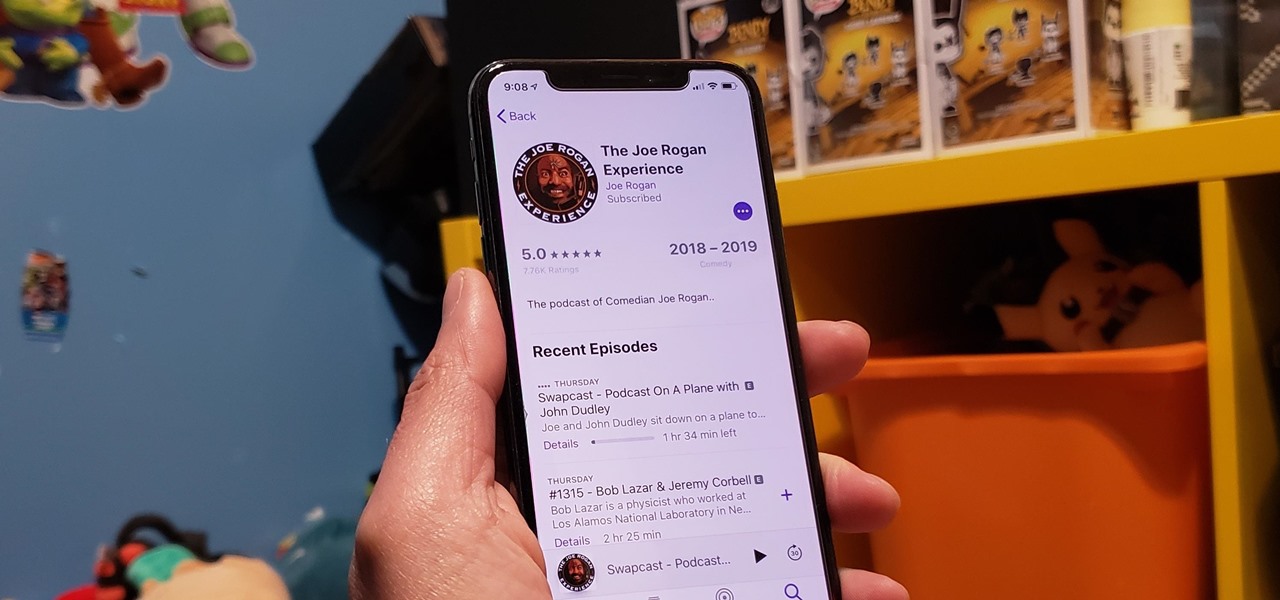Home>Events & Info>Podcast>How To Punctuate Podcast Titles


Podcast
How To Punctuate Podcast Titles
Published: December 12, 2023
Learn the proper way to punctuate podcast titles and improve your podcast's visibility and readability. Enhance your podcast metadata with effective punctuation techniques.
(Many of the links in this article redirect to a specific reviewed product. Your purchase of these products through affiliate links helps to generate commission for AudioLover.com, at no extra cost. Learn more)
Table of Contents
Introduction
Podcasts have experienced a surge in popularity in recent years, with millions of episodes available on various platforms covering a wide range of topics. As a podcast creator, one of the key aspects to consider is how to punctuate your podcast titles properly. While it may seem like a minor detail, proper punctuation can greatly impact how your podcast is perceived, improve its searchability, and make it more visually appealing to potential listeners.
In the world of SEO (Search Engine Optimization), proper punctuation is essential. Search engines rely on punctuation to understand the context and meaning of a title, and to index and rank content accordingly. By using the appropriate punctuation techniques, you can help search engines recognize the important keywords in your podcast title and improve its visibility to potential listeners.
In addition to SEO benefits, proper punctuation also enhances the readability and professionalism of your podcast titles. It helps to convey the intended message clearly and succinctly, making it easier for prospective listeners to understand what your podcast is about at a glance.
In this article, we will explore the importance of proper punctuation in podcast titles and provide you with some best practices to follow. We will also highlight common punctuation mistakes to avoid. So, whether you are just starting out or looking to refine your podcast titles, read on to discover how to punctuate your podcast titles effectively.
Importance of Proper Punctuation
Proper punctuation plays a crucial role in effectively conveying the meaning and essence of your podcast titles. Here are some key reasons why it is important to pay attention to punctuation:
- Clarity and Understanding: Punctuation helps to clarify the intended message and structure of your podcast title. It provides cues to the reader, allowing them to interpret the title correctly and understand the context. Without proper punctuation, the title can be ambiguous or confusing, leading to a loss of interest from potential listeners.
- Improves Searchability: Search engines rely on punctuation to analyze and index content. By using proper punctuation in your podcast titles, you increase the chances of search engines recognizing the keywords and relevant information, thereby improving the searchability of your podcast. This can help attract more organic traffic and potential listeners.
- Enhances Professionalism: Proper punctuation adds a layer of professionalism to your podcast titles. It demonstrates attention to detail and shows that you value clear communication. This professionalism can make your podcast titles more appealing and trustworthy to potential listeners.
- Visual Appeal: Punctuation can enhance the visual appeal of your podcast titles. The use of appropriate punctuation marks can break up the title into readable chunks, making it more visually appealing and easier to scan. This can help catch the attention of potential listeners who are skimming through content.
- Conveys Tone and Emphasis: Punctuation also helps to convey the intended tone and emphasis of your podcast title. By using punctuation marks such as exclamation points or question marks, you can evoke excitement, curiosity, or a sense of inquiry. This can generate interest and intrigue among potential listeners.
Overall, proper punctuation in podcast titles is essential for clarity, searchability, professionalism, visual appeal, and conveying the intended tone. Investing the time and effort into punctuating your titles correctly can have a significant impact on the success and visibility of your podcast. In the next section, we will explore some basic punctuation rules to keep in mind when crafting your podcast titles.
Basic Punctuation Rules
Proper punctuation in podcast titles follows certain rules that help maintain clarity and readability. Here are some basic punctuation rules to keep in mind when crafting your podcast titles:
- Title Capitalization: Capitalize the first letter of each main word in your podcast title, such as nouns, verbs, adjectives, and adverbs. Articles, conjunctions, and prepositions are usually not capitalized unless they are the first or last word in the title.
- Commas: Use commas to separate different elements within the podcast title. Commas can be used to separate keywords, phrases, or to indicate a pause in the title. However, be cautious not to overuse commas, as it can make the title appear cluttered and difficult to read.
- Hyphens and Dashes: Hyphens and dashes serve different purposes in podcast titles. Hyphens are used to connect compound words, while dashes can be used to indicate a pause or a break in the title. Pay attention to whether you need a hyphen or a dash based on the specific context.
- Apostrophes: Use apostrophes to signify possessive forms or contractions. For example, “John’s Journey” indicates that the journey belongs to John, while “We’re Exploring” is a contraction of “We are Exploring”. Be mindful of using apostrophes correctly to avoid confusion.
- Quotation Marks: Quotation marks are used to denote direct speech or when referencing specific words or phrases. For example, if your podcast title is “The Power of “Yes””, the quotation marks indicate that “Yes” is being highlighted. However, use quotation marks sparingly to avoid cluttering the title.
- Exclamation Points and Question Marks: Exclamation points and question marks are used to convey excitement or inquiry respectively. Use them sparingly and only when appropriate to emphasize a particular aspect of your podcast title.
While these are some of the basic punctuation rules, it’s important to note that the specific punctuation used will depend on the style and tone of your podcast. It’s always a good idea to proofread and revise your podcast titles to ensure that the punctuation is used accurately and effectively.
Now that we have covered the basic punctuation rules, let’s move on to some best practices for punctuating your podcast titles in the next section.
Best Practices for Punctuating Podcast Titles
When it comes to punctuating your podcast titles, following certain best practices can help you create titles that are not only clear and concise, but also optimized for search engines. Here are some best practices to consider:
- Keep it Simple: Aim for simplicity in your podcast titles. Avoid excessive punctuation or complex sentence structures that can make the title difficult to understand. A concise and straightforward title is more likely to grab the attention of potential listeners.
- Focus on Keywords: Incorporate relevant keywords in your podcast title and ensure they are easily recognizable. Use punctuation to separate different keywords or to emphasize the main topic of your podcast. This can greatly improve the searchability of your podcast and attract the right audience.
- Consider Readability: Use punctuation marks strategically to break up your podcast titles and make them more visually appealing and readable. Consider using hyphens, colons, or parentheses to separate different elements or add additional information. However, be careful not to overuse punctuation marks, as it can make the title appear cluttered.
- Consistency is Key: Maintain consistency in your punctuation style throughout your podcast titles. This helps create a cohesive and professional brand identity. Choose a specific style, such as using punctuation at the end of every title or only using it sparingly for emphasis, and stick to that style consistently.
- Avoid Overused Punctuation: While certain punctuation marks, such as exclamation points, can add emphasis, it’s important to use them sparingly. Overusing exclamation points or question marks can make your titles appear spammy or unprofessional. Reserve them for when they truly enhance the meaning and tone of the title.
- Avoid Clickbait Tactics: While it may be tempting to use excessive punctuation or symbols to attract attention, it’s important to avoid clickbait tactics. Focus on providing an accurate and descriptive title that reflects the content of your podcast. Misleading or exaggerated punctuation can lead to negative user experiences and loss of credibility.
- Proofread and Test: Before finalizing your podcast titles, proofread them for any punctuation errors or inconsistencies. Read the titles aloud to ensure they flow smoothly and make sense. You can also test different versions of your titles with a small sample audience to gather feedback and make improvements.
By following these best practices, you can create podcast titles that are not only punctuated correctly but also optimized for search engines and enticing to potential listeners. Now let’s move on to some examples of correctly punctuated podcast titles for reference.
Examples of Correctly Punctuated Podcast Titles
Let’s take a look at some examples of correctly punctuated podcast titles to better understand how the punctuation can enhance the clarity and effectiveness of the titles:
- “The Power of Storytelling: Unleashing Creativity” – This title uses a colon to separate the main topic (“The Power of Storytelling”) from the subtitle (“Unleashing Creativity”). The colon helps to indicate that the second part is a continuation or elaboration of the first part.
- “Exploring the Unknown: A Journey of Discovery” – The use of a colon here separates the main topic (“Exploring the Unknown”) from the accompanying phrase (“A Journey of Discovery”). This punctuation adds emphasis to the exploration aspect and provides additional context for the listener.
- “The Art of Conversation: Navigating Difficult Dialogues with Grace” – In this title, the colon is used to highlight the main topic (“The Art of Conversation”) and the subtitle (“Navigating Difficult Dialogues with Grace”). The colon acts as a visual cue to show that the two parts are closely related but distinct.
- “Mindfulness Matters: Cultivating Inner Peace and Well-being” – This podcast title uses a colon to separate the overarching theme (“Mindfulness Matters”) from the specific focus (“Cultivating Inner Peace and Well-being”). The colon helps to convey that both parts are connected and contribute to the overall message of the podcast.
- “The Science of Sleep: Why Rest Matters for Your Health and Productivity” – Here, a colon is used to separate the main topic (“The Science of Sleep”) from the explanatory subtitle (“Why Rest Matters for Your Health and Productivity”). The colon adds clarity and lets the listener know that the subtitle provides further information about the topic.
These examples demonstrate how the use of colons, in particular, can effectively punctuate podcast titles by dividing them into distinct parts. This helps convey the main theme, highlight subtopics, and improve the overall readability and understanding for potential listeners.
Now that we have seen examples of correctly punctuated podcast titles, let’s explore some common punctuation mistakes to avoid in the next section.
Avoiding Common Punctuation Mistakes
While proper punctuation can greatly enhance your podcast titles, it’s equally important to be aware of and avoid common punctuation mistakes. Here are a few common errors to steer clear of:
- Overusing Punctuation: One of the most common mistakes is overusing punctuation marks. Excessive use of exclamation points, question marks, or commas can make your title appear cluttered and unprofessional. Use punctuation marks judiciously, only when necessary for clarity or emphasis.
- Incorrect Use of Apostrophes: Apostrophes are frequently misused, especially for plurals. Remember that apostrophes are used to indicate possession or contraction, not to make a word plural. For example, “Podcast’s popularity is increasing” is incorrect; it should be “Podcasts’ popularity is increasing.”
- Mixing Up Hyphens and Dashes: Hyphens and dashes serve different purposes. Mixing them up can lead to confusion. Hyphens connect words, while dashes indicate a pause or break in a sentence. Make sure to use the appropriate one based on the intended use-case.
- Inconsistent Capitalization: Inconsistently capitalizing words in your podcast titles can create confusion and inconsistency in your brand identity. Choose a specific capitalization style and stick to it throughout your titles.
- Omitting Essential Punctuation: Leaving out necessary punctuation can change the meaning or clarity of your podcast title. Be sure to include commas, colons, and other punctuation marks where necessary to maintain the intended structure and message.
- Misusing Quotation Marks: Quotation marks should only be used to denote direct speech or to indicate specific words or phrases. Using quotation marks unnecessarily or inconsistently can create confusion and make your titles appear unprofessional.
Avoiding these common punctuation mistakes will help you maintain consistency, professionalism, and readability in your podcast titles. Remember to proofread your titles carefully and seek feedback if possible to ensure they are punctuated correctly and effectively convey your desired message.
Now that we have covered common punctuation errors to avoid, let’s conclude our discussion on punctuating podcast titles in the next section.
Conclusion
Punctuating your podcast titles correctly is more important than you might think. Proper punctuation not only enhances the clarity and professionalism of your titles but also improves their searchability and visual appeal. By following basic punctuation rules and best practices, you can create titles that effectively convey your podcast’s message, attract potential listeners, and optimize your content for search engines.
Remember to keep your titles simple, focus on relevant keywords, and maintain consistency in your punctuation style. Be mindful of readability, avoiding excessive or incorrect use of punctuation marks. Proofreading and testing your titles before finalizing them is crucial to ensure accuracy and clarity.
By emphasizing punctuation, you can make your podcast titles stand out, increase their visibility, and create a positive impression on potential listeners. So, take the time to carefully punctuate your podcast titles and pay attention to the details. It can make a significant difference in attracting the right audience and achieving the success your podcast deserves.
Now armed with the knowledge of proper punctuation, go ahead and polish your podcast titles to grab the attention of listeners and optimize them for search engines. Happy podcasting!











